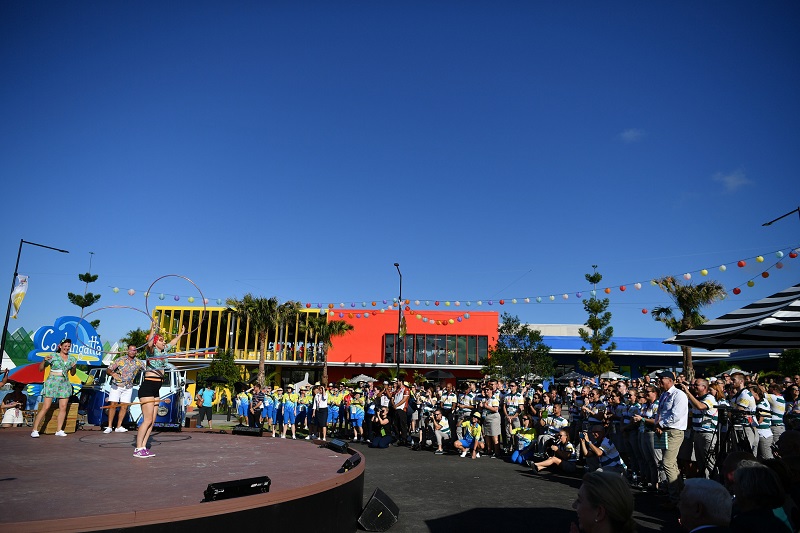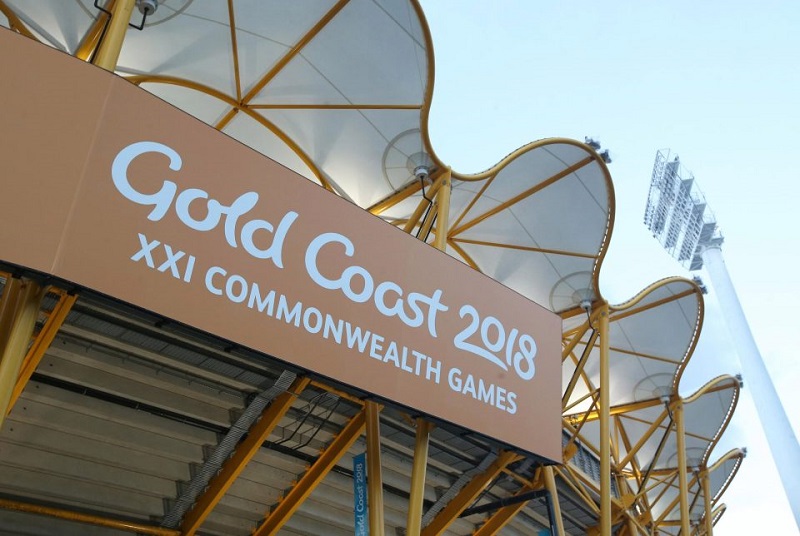
Australia men and women aim to defend their titles on home soil
13 of 20 competing teams looking to gain momentum ahead of World Cups
Action takes place at newly-upgraded Gold Coast Hockey Centre
One of the world’s biggest international multi-sport events gets underway today as the 21st edition of the quadrennial Commonwealth Games begins in Australia, with the men’s and women’s hockey competitions starting on Thursday.
The Gold Coast 2018 Commonwealth Games will see more than 6,600 athletes and team officials representing 71 Commonwealth nations and territories welcomed to the event cities of Gold Coast, Brisbane, Cairns and Townsville, all sharing in the celebration of sport, entertainment and culture.
It is the biggest sporting event to be staged in Australia this decade and will feature the largest integrated sports programme in Commonwealth Games history, comprising 18 sports and seven para-sports.
Hockey is a core sport at the Commonwealth Games, having been part of the schedule since debuting at the 1998 event in Kuala Lumpur, Malaysia.
The men’s and women’s hockey competitions, which will be played at the newly-upgraded Gold Coast Hockey Centre in Labrador, features some of the world’s finest international teams and looks set to be utterly compelling from start to finish.
With no fewer than 13 of the 20 teams that will compete at Gold Coast 2018 having also qualified for the respective Vitality Hockey Women’s World Cup London 2018 (21 Jul – 5 Aug 2018, England) and Odisha Hockey Men’s World Cup Bhubaneswar 2018 (28 Nov -16 Dec 2018, India) events later this year, they will know that glory on the Gold Coast would be a welcome boost ahead of those iconic competitions.
As well as featuring some undisputed heavyweights, one of the beauties of the hockey competitions at the Commonwealth Games is the prospect of compelling match-ups between nations that rarely play each other.
It is these scenarios where acts of ‘giant killing’ can take place and players who normally compete in front of a handful of spectators suddenly find themselves in the role of hero, with an in-venue audience of thousands plus millions more watching on TV across the world.
In the first phase of both the men’s and women’s competition, the ten teams will be divided into two pools of five nations. With only the top two finishers securing a place in the competition semi-finals, which in turn lead to the all-important medal matches, there will be a considerable amount of pressure for the teams to start their campaigns with a victory and get crucial points on the board as early as possible.
With three current continental champions – not to mention a team that is blessed with numerous Olympic gold medallists – it is clear that the women’s competition will be fiercely contested and difficult to predict.
In Pool A, England (FIH Hero World Ranking: 2) will be seen as favourites to win the pool but face stern challenges from Asian continental champions India (WR:10) and African champions South Africa (WR:14) as well as Malaysia (WR:22) and Wales (WR:26) – two rapidly progressing nations.
The England team selected by master tactician Danny Kerry contains a glittering array of world class talent including ace striker Alex Danson, reigning FIH Hockey Stars Goalkeeper of the Year Maddie Hinch and brilliant defender Hollie Webb, players who were all members of Great Britain’s Olympic gold medal-winning team from Rio 2016.
However, Kerry’s team will need to be at their best if they are to fulfil their ambition of winning a first ever Commonwealth Games gold medal after finishing runners up at the Kuala Lumpur 1998, Manchester 2002 and Glasgow 2014 events.
In Manchester England’s defeat came at the hands of India, a team that will fancy their chances of medalling at Gold Coast 2018, especially on the back of their outstanding title success at last year’s Asia Cup, which was played in Kakamigahara, Japan. Star striker Rani remains a talismanic figure for the Eves and could well inspire her team to their first podium finish at a Commonwealth Games since their silver medal at the Melbourne 2006 event.
Like India, South Africa are also continental champions, having claimed the Africa Cup for Nations last year in Egypt. Dirkie Chamberlain was a key player in that continental championship winning side and will once again again be one to watch. Although Malaysia and Wales sit further down the FIH Hero World Rankings, they both have enough quality to give their higher ranked opponents a serious run for their money at this event.
Women’s Pool B will be equally competitive, especially with fierce Oceania rivals Australia (WR: 5) and New Zealand (WR:4) in action alongside Scotland (WR:18), Canada (WR:21) and Ghana (WR:30).
Australia’s Hockeyroos may sit one place below New Zealand’s Black Sticks in the FIH Hero World Rankings but come into this event not just as reigning Commonwealth Games champions but also as the champions of Oceania, having beaten New Zealand to the title at last year’s continental championship. Australian penalty corner ace Jodie Kenny and Black Sticks attacker Anita McLaren are likely to be influential players for their respective teams on the Gold Coast.
While the rankings gap between the Oceania giants and fellow Pool B competitors Scotland, Canada and Ghana is significant, they are certainly not teams to be taken lightly.
Scotland have some real talent in their ranks such as Great Britain internationals Sarah Robertson, Amy Gibson, Nicola Cochrane and Amy Costello while Canada and Ghana both performed well in their respective continental championships last year. The Canadians were beaten to a place on the podium by USA in the Pan American Cup, while Ghana finished second behind winners South Africa in the Africa Cup for Nations.
In the men’s event, Australia (WR:1) will be seen as hot favourites to claim a remarkable sixth successive title. Not only are they the top ranked team in the game and have the advantage of playing at home, they are also the current holders of the World Cup, Hockey World League, Oceania and Champions Trophy titles, making it understandable why many believe that they will give iconic team captain Mark Knowles the perfect ending to his international career with a gold medal on the Gold Coast.
Australia will definitely not be given an easy ride in Pool A, with New Zealand (WR:9), Canada (WR:11), South Africa (WR:15) and Scotland (WR:23) all extremely motivated by the prospect of potentially causing a huge upset against the mighty Kookaburras in their own back yard.
New Zealand, twice podium finishers in previous editions of the Commonwealth Games, will fancy their chances of medalling at this event, while Canada – lead by hugely experienced defender Scott Tupper – are always dangerous and unpredictable.
With African continental champions South Africa and a talented, improving Scotland team also in the mix, Pool A looks capable of producing some surprise results.
With India (WR:6), England (WR:7), Malaysia (WR:12), Pakistan (WR:13) and Wales (WR:24) all featuring, Pool B looks extremely hard to predict and has plenty of sub-plots.
As well as the always intriguing clash between eternal rivals India and Pakistan, the latter of which is now coached by former India boss Roelant Oltmans, there is also the chance for Malaysia to gain a measure of revenge against an England team that thrashed them 7-2 in the semi-finals of the recent Sultan Azlan Shah Cup in Ipoh.
As suggested by their rankings, Asian continental champions India and England, who eventually finished second behind Australia at the Azlan Shah event, should be the front-runners for the two available semi-final berths.
Both sides are blessed with numerous outstanding individuals, with India captain Manpreet Singh and England attacker Barry Middleton being two of numerous world class individuals contained in their respective ranks.
In recent months Malaysia have shown that on their day they are capable of beating the very best in the world, a fact proven by their impressive 2-1 victory over Olympic champions Argentina at the Azlan Shah event.
2006 Commonwealth Games silver medallists Pakistan will be boosted by the arrival of celebrated Dutchman Oltmans and could well challenge, while Wales will grab the opportunity to prove themselves against higher-ranked opponents with both hands.
The hockey competitions of the Gold Coast 2018 Commonwealth Games get underway on Thursday 5 April.
The opening four matches at the Gold Coast Hockey Centre all take place in women’s tournament, with the Pool A meeting between the India and Wales getting things started at 09:30 Australian Eastern Standard Time (UTC/GMT +10 hours) before Scotland take on New Zealand in Pool B at 11:30. England’s Pool A clash against South Africa begins at 14:30, with home favourites Australia playing Canada in Pool B at 16:30.
The opening day’s play will be completed by the first two matches of the men’s competition, with Pool B rivals Pakistan and Wales taking to the field at 19:30 ahead of the Pool A face-off between South Africa and Scotland, which begins at 21:30. The full schedule can be viewed here.
Follow the action at fih.ch and through our social channels where we will post regular updates and reports.
Tickets for some matches at the Gold Coast 2018 Commonwealth Games are still available. To find out more information, please click here.
#GC2018






























